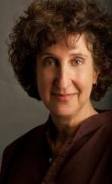Bronx-born Cynthia Holz first came to Canada as a correspondent for Business Week, then left journalism so she could focus on writing fiction. She’s been a resident of Toronto since 1976.
After two dozen of her stories were published in Canadian magazines, Random House published 10 of the best in Home Again, a short story anthology that appeared in 1989. Numerous stories dealt with Jewish widows or widowers coping with the loss of a partner.
 Holz’s first novel, Onlyville (Porcupine’s Quill Press), the story of a woman’s quest for autonomy and understanding, gained critical acclaim in 1994. Now she has just published a second novel, The Other Side (Second Story Press, 1998).
Holz’s first novel, Onlyville (Porcupine’s Quill Press), the story of a woman’s quest for autonomy and understanding, gained critical acclaim in 1994. Now she has just published a second novel, The Other Side (Second Story Press, 1998).
The Other Side begins when Holly, an actor and housecleaner, comes home from a rendezvous with her married lover to find her gay roommate slumped over the kitchen table, a suicide victim. After the police leave, she discovers that he is still present as a ghost, haunting the kitchen. What follows is an exploration into the lives of two lost souls, with some surprises.
A creative writing instructor at Ryerson Polytechnical University, Holz’s writing is known for its immediacy, warmth, vivid images and realism. Paradoxically, even her depiction of a ghost seems realistic, since Marc’s limited supernatural abilities are carefully defined; he is not the Shakespearean variety of ghost, ominous and threatening, with vague and sweeping powers. The kitchen is his primary realm.
* * *
With her fourth novel A Good Man (Thomas Allen, 2003), Toronto author Cynthia Holz has chosen a theme close to home by writing about Jewish characters struggling with how the Holocaust has shaped their lives and self-perceptions.
Published last spring by Thomas Allen, A Good Man is a study of the lives of Izzy Schneider and Phil Lewis, Toronto friends who had appreciably different experiences in the Holocaust. Wherease Izzy escaped, leaving behind his family in Berlin, Phil fought the Nazis in Poland as a partisan and became a war hero.
Izzy’s conscience condemns him in later years for not having done enough, but Holz renders a far more balanced judgement. She also shows that someone who had emerged heroic from the Nazi cauldron can yet be deficient in major areas of character.
“My whole point is that these labels don’t stick because they aren’t appropriate,” Holz said in a recent interview. “The truth is always much subtler. My feeling is that we’re all in the middle ground, neither this nor that. People are complex and subtle and a mix of many things.”
The story is literally triggered by the mysterious shooting death of Phil Lewis, who had operated a shirt factory, employing Izzy among many others. To Izzy, Phil was almost family, since his daughter Eva had married Phil’s son Roger and produced a son. Attempting to gain insight into Phil and perhaps himself own as well, Izzy begins an unofficial investigation into Phil’s life.
Dark secrets of the gothic variety are not lacking among these characters, especially Eva. The author’s intent seems to be to alleviate the heavy judgement Izzy makes against himself by showing that he actually accomplished much good and was, indeed, “a good man.” Simultaneously, many unsavoury aspects come to light of the supposedly heroic Phil.
Set in Toronto and Florida in a time near the present, A Good Man avoids any scenic presentation of the Holocaust. Its theme concerns the continuing effects of that dramatic upheaval many years later upon the aging survivors and their children.
“It’s a book that deals with the second generation — the guilt and the shame that the second generation carried even though they never went through the war,” Holz said. “I didn’t want to write a book that was directly about the Holocaust, partly because it’s already been done. There are plenty of stories that need to be told about the second generation and how the history and the intense feelings of the Holocaust are carried on.
“Also, I wanted to address the story of someone who didn’t go through the camps or the ghettos, and who left in time, and how he was not spared — it still wrecked his life. He carried enormous amounts of guilt and grief and shame. And I wanted to address the dislocation that comes with leaving your culture and your home and starting all over again.”
In some ways, Izzy’s story parallels that of Holz’s father, who died five years ago, leaving behind a packet of letters from family members who perished in Europe. She would not have felt comfortable writing the book while he was alive, she said.
The New York-born author, who came to Canada in 1976 as a magazine correspondent and stayed, has previously penned Onlyville, The Other Side and Semi-detached, as well as the short-story collection Home Again. Her latest novel is the first in her oeuvre that deals with a Holocaust theme and in which the Jewishness of the main characters is not incidental.
“It’s a departure for me, and it’s where I’m going now with my work as I get older,” she said. “As one gets older, one begins to question the meaning of life. I’m looking for deeper meaning and how we look at our world . . . I’ve always written about relationships but in this case I’m taking on three generations and a lot of historical stuff as well.” ♦
© 1998, 2003





